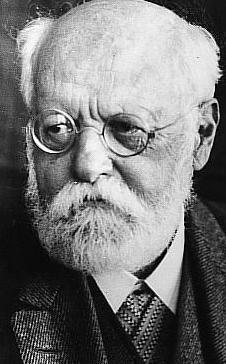Karl Kautsky
From Kaiserreich
Karl Kautsky (born October 16, 1854) is a German leading theoretician of social democracy. He became a significant figure in Marxist history as the editor of the fourth volume of Karl Marx's economic critique, Das Kapital. He became the leading promulgator of Orthodox Marxism after the death of Friedrich Engels. He is the current Chairman of the Sozialdemokratische Partei Deutschlands (Social Democratic Party of Germany).
Life
Karl Kautsky was born in Prague of artistic middle class parents. The family moved to Vienna when he was seven years old. He was studying history and philosophy at the University of Vienna in 1874, and became a member of the Social Democratic Party of Austria (SPÖ) in 1875. In 1880 he joined a group of German socialists in Zurich who were supported financially by Karl Höchberg, and who smuggled socialist material into the Reich at the time of the Anti-Socialist Laws. Influenced by Eduard Bernstein, Höchberg's secretary, he became a Marxist and in 1881 visited Marx and Engels in England.
In 1883, Kautsky founded the monthly Die Neue Zeit ("The New Time") in Stuttgart, which became a weekly in 1890, and was its editor until September 1917 which gave him a steady income and allowed him to propagate Marxism. From 1885 to 1890, he spent time in London, where he became a close friend of Friedrich Engels. In 1891, he co-authored the Erfurt Program of the Social Democratic Party of Germany (SPD) together with August Bebel and Eduard Bernstein.
Following the death of Engels in 1895, Kautsky became one of the most important and influential theoreticians of Marxism, representing the centre current of the party together with August Bebel. When Bernstein attacked the traditional Marxist position on the necessity for revolution in the later 1890s, Kautsky denounced him, arguing that Bernstein's emphasis on the ethical foundations of Socialism opened the road to a call for an alliance with the "progressive" bourgeoisie and a non-class approach.
In 1914 with the other German Social-Democrats Kautsky voted for the war credits. Kautsky claimed that Germany was waging a defensive war against the threat of Czarist Russia. However, in June 1915, about ten months after the war had began and when it had become obvious that this was going to be a sustained, appallingly brutal and costly struggle, he issued an appeal with Eduard Bernstein and Hugo Haase against the pro-war leaders of the SPD and denounced the government's annexationist aims. In 1917 he left the SPD for the Independent Social Democratic Party of Germany (USPD), which united Socialists who opposed the war.
The quick decline of the SPD influence during both Hindenburg-Ludendorff dictatorship and Tirpitz Chancellorship, due to the popular defiance due to the French revolution and the final successes of Germany in the Weltkrieg, permitted the reunification between SPD and USPD in the 1920's. Kautsky, who was considered by his more extremist counterparts (Liebknecht's Spartakusbund and Thälmann's Marxists-Leninists) as a traitor due to his soft positions, soon moved to a softer position, advocating for a truely Marxist SPD, proponent of the British system. After Friedrich Ebert's death in 1925, Karl Kautsky was elected to the post of Chairman of the SPD: his old age was among the factors for his election.
If Kautsky had succeeded to give a new marxist orientation to the former greateast party of Germany, he was unable to stop the growing influence of the Pan-Germanists, which is taking a huge part of the traditional voters of SPD. He has also to deal with the various factions of SPD, all more or less inspired by the different models throughout the world, such as Britain, France or short-lived Soviet Russia, thinking that the cause of social-democracy is impossible to succeed in the current world.
Major Works
- Frederick Engels: His Life, His Work and His Writings (1887)
- The Economic Doctrines of Karl Marx (1887/1903)
- Thomas More and his Utopia (1888)
- The Class Struggle (1892)
- On The Agrarian Question (1899)
- The Social Revolution and on the day After the Social Revolution (1902)
- Foundations of Christianity (1908)
- The Road to Power (1909)
- Are the Jews a Race? (1914)
- The Dictatorship of the Proletariat (1918)
- Terrorism and Communism (1919)
- The Labour Revolution (1924)

